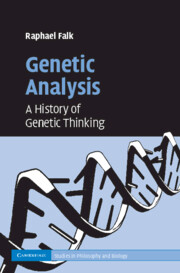Book contents
- Frontmatter
- Contents
- List of figures
- Acknowledgments
- Introduction
- PART I FROM REPRODUCTION AND GENERATION TO HEREDITY
- PART II FAKTOREN IN SEARCH OF MEANING
- PART III THE CHROMOSOME THEORY OF INHERITANCE
- PART IV GENES AS THE ATOMS OF HEREDITY
- PART V INCREASING RESOLVING POWER
- PART VI DEDUCING GENES FROM TRAITS, INDUCING TRAITS FROM GENES
- PART VII WHAT IS TRUE FOR E. COLI IS NOT TRUE FOR THE ELEPHANT
- Concluding comments
- Bibliography
- Index
Introduction
Published online by Cambridge University Press: 07 August 2009
- Frontmatter
- Contents
- List of figures
- Acknowledgments
- Introduction
- PART I FROM REPRODUCTION AND GENERATION TO HEREDITY
- PART II FAKTOREN IN SEARCH OF MEANING
- PART III THE CHROMOSOME THEORY OF INHERITANCE
- PART IV GENES AS THE ATOMS OF HEREDITY
- PART V INCREASING RESOLVING POWER
- PART VI DEDUCING GENES FROM TRAITS, INDUCING TRAITS FROM GENES
- PART VII WHAT IS TRUE FOR E. COLI IS NOT TRUE FOR THE ELEPHANT
- Concluding comments
- Bibliography
- Index
Summary
The subject of this book is genetic analysis. I have been involved in genetic analysis for over a half century, first in active experimental research and later doing research on the history and philosophy of genetics.
In 1965, the centenary of Mendel's presentation to the Natural History Society in Brno, two books were published with almost identical titles by two leading geneticists of that time: Alfred H. Sturtevant's A History of Genetics (1965) and Leslie C. Dunn's A Short History of Genetics (1965). Sturtevant's preface was very brief and succinct: “The publication of Mendel's paper of 1866 is the outstanding event in the history of genetics; but … the paper was overlooked until 1900, when it was found. Its importance was then at once widely recognized. These facts make the selection of topics for the early chapters of this book almost automatic” (Sturtevant, 1965, vii). I will discuss this notion at some length in later chapters. Dunn's approach was more reflective; he focused on the role and significance of the history of science. With respect to the history of genetics, Dunn noted:
One of the interesting things about the history of genetics is that a few relatively simple ideas, stated clearly and tested by easily comprehended breeding experiments brought about a fundamental transformation of views about heredity, reproduction, evolution and the structure of living matter. It was chiefly the elucidation of the theory of the gene and its extension to the physical basis of heredity and to the causes of evolutionary changes in populations which gave genetics its unified character.
Dunn (1965, vii)- Type
- Chapter
- Information
- Genetic AnalysisA History of Genetic Thinking, pp. 1 - 10Publisher: Cambridge University PressPrint publication year: 2009



